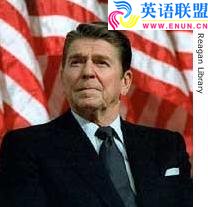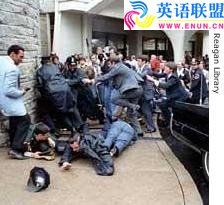The troubles of Jimmy Carter's presidency led many Americans to support Ronald Reagan for president. He promised to make the United States strong again.
VOICE ONE:
This is Rich Kleinfeldt.
VOICE TWO:
And this is Doug Johnson with THE MAKING OF A NATION -- a VOA Special English program about the history of the United States.
(MUSIC)
 Ronald Reagan | ||
(MUSIC)
VOICE ONE:
The president of the United States in nineteen eighty was Jimmy Carter, a Democrat. The months before Election Day were difficult for him. Many Americans blamed Carter for high inflation, high unemployment, and the low value of the United States dollar. Many blamed him for not gaining the release of American hostages in Iran.
About a year earlier, Muslim extremists had taken the Americans prisoner after seizing the United States embassy in Tehran. President Carter asked all Americans to support his administration during the crisis.
As months went by, however, he made no proGREss in bringing the hostages home. The Iranians rejected negotiations for their release. Sometimes, they did not communicate with the Carter administration at all. The president appeared powerless.
VOICE TWO:
Carter's political weakness led another Democrat to compete for the party's presidential nomination. It was Edward Kennedy, brother of former President John Kennedy. He was a powerful senator from Massachusetts.
Carter was re-nominated. So was his vice president, Walter Mondale. Kennedy did not support them very strongly. So the Democratic Party was divided for the general election.
The Republican Party, however, was united behind a strong candidate. That was Ronald Reagan, a former actor and former governor of California. Reagan's vice presidential candidate was George Bush. Bush had served in ConGREss and as head of the Central Intelligence Agency. He had represented the United States in China and at the United Nations.
VOICE ONE:
The troubles of the Carter administration caused many Americans to feel that their country was no longer strong. Ronald Reagan promised to make it strong again.
Several weeks before the election, Carter and Reagan debated each other on television. Some observers said Carter seemed angry and defensive. They said Reagan seemed calm and thoughtful. On Election Day, voters gave Reagan a huge victory. He won by more than eight million popular votes. Republicans called it the "Reagan Revolution."
VOICE TWO:
On Inauguration Day, the new president spoke about the goals of his administration. A major goal was to reduce the size of the federal government. Reagan and other conservatives believed that the nation's economy was suffering because of high taxes and unnecessary laws. In this crisis, he said, government was not the solution to the problem, government was the problem.
He urged Americans to join him in what he called a "new beginning." And he expressed hope that the people would work with him.
REAGAN: "The economic ills we suffer have come upon us over several decades. They will not go away in days, weeks, or months. But they will go away. They will go away because we as Americans have the capacity now -- as we have had in the past -- to do whatever needs to be done to preserve this last and GREatest bastion of freedom."
VOICE ONE:
Ronald Reagan was born in nineteen eleven, in the little town of Tampico, Illinois. He was a good student and a good athlete. During the summer, he worked as a lifeguard at a local swimming area. One summer, he saved the lives of twenty-seven people.
He studied economics and sociology at Eureka College, a small school in Illinois. At the college, he saw a theater production. When it was over, he said, "More than anything in the world, I wanted to speak the actor's words."
VOICE TWO:
Reagan did not have enough money to go to New York or Hollywood to be an actor. Instead, he tried to get a job as a sports announcer on radio. To show his abilities, he made a recording of an American football game in which he announced all the plays. There really was no game, however. He had invented all the action.
A radio station in the small city of Davenport, Iowa, was pleased with his creativity. He got the job.
VOICE ONE:
Later, he worked at a radio station in Des Moines, Iowa. And then he moved to the big city of Chicago, Illinois. There he announced the action of baseball games.
When the team went to California to play, Reagan went, too. This gave him a chance to take a screen test to become a movie actor. The Warner Brothers Motion Pictures company liked the friendly, handsome young man and offered him a job.
VOICE TWO:
Before long, Ronald Reagan was a Hollywood star. He appeared in many movies. These included "The Knute Rockne Story," "Bedtime for Bonzo," and "King's Row." They were not the very best motion pictures made in Hollywood, but they were popular. During one movie, he met actress Nancy Davis. They married after he was divorced from his first wife.
Reagan became deeply interested in politics during his years in Hollywood. He was a liberal, but became increasingly conservative. He served six times as president of a union of movie actors. He was noted for his opposition to anyone in the movie industry who supported communism.
VOICE ONE:
By the early nineteen fifties, Reagan had stopped appearing in movies. Instead, he appeared on television. He made advertisements and also presented a series of dramatic shows.
By nineteen sixty, he was making speeches for conservative Republican candidates. In nineteen sixty-six, he became a candidate himself. He ran for governor of California. The Democrats did not think he was a serious candidate. They told jokes about some of his movies. They made a mistake. When the voting was over, Reagan had won by almost one million votes.
As governor, Reagan was praised for reducing the state's huge debt. However, he was criticized for raising taxes. He also was criticized for his severe policies for controlling unrest at the state's colleges. Yet, he won re-election in nineteen seventy.
VOICE TWO:
Reagan campaigned for the Republican nomination for president in nineteen seventy-six. He almost defeated President Gerald Ford for the nomination. One of the party's older senators spoke with Reagan after the convention. He said, "Son, you will be president some day. This just was not your year." Four years later, with President Jimmy Carter in trouble, Reagan's day had arrived.
VOICE ONE:
Ronald Reagan was sworn-in as America's fortieth president on January twentieth, nineteen eighty-one. For many Americans, the day turned out even happier than expected. Iran finally announced that it would free the hostages in Tehran.
One of President Reagan's earliest proposals made many Americans happy, too. He began to work to get ConGREss to reduce taxes. He also began a weekly series of radio broadcasts. In these programs, he commented on developments in American life and political policy. The broadcasts were similar to those made by President Franklin Roosevelt during the nineteen-thirties. Some people started to call Reagan "The Great Communicator."
VOICE TWO:
 Outside the Washington Hilton Hotel after the assassination attempt on President Reagan |
||
The president was leaving a meeting at a hotel in Washington. A gunman began to fire. A man guarding the president fell to the ground. So did the president's press assistant. Both were seriously wounded.
Other guards quickly helped Reagan into his car. At first, observers did not think the president had been hit. But he had. There was a bullet in his left lung, close to his heart. Doctors removed the bullet. Reagan fought courageously to get well...and he did.
We will continue the story of President Ronald Reagan next week.
(MUSIC)
VOICE ONE:
This program of THE MAKING OF A NATION was written by Jeri Watson and produced by Paul Thompson. This is Rich Kleinfeldt.
VOICE TWO:
And this is Doug Johnson. Join us again next week for another VOA Special English program about the history of the United States.


